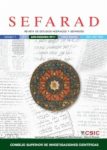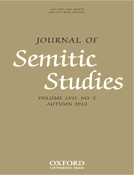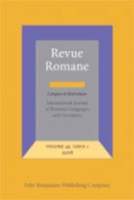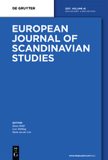
Miscelanea de Estudios Arabes y Hebraicos-Seccion Hebreo
Scope & Guideline
Exploring the Rich Tapestry of Arabic and Hebrew Studies
Introduction
Aims and Scopes
- Interdisciplinary Studies:
The journal emphasizes a multidisciplinary approach, integrating history, literature, linguistics, and cultural studies to explore the rich tapestry of Hebrew and Arabic influences. - Historical Contextualization:
A significant focus is placed on historical analyses of Jewish and Arab communities, particularly in relation to the Iberian Peninsula, examining their cultural exchanges and societal dynamics throughout different historical epochs. - Literary Analysis:
The journal publishes works that delve into literary texts, exploring themes, styles, and cultural significance within Hebrew and Arabic literature, including medieval and contemporary works. - Linguistic Exploration:
Research on language, including the evolution of Sephardic languages and dialects, is a core area, highlighting their significance in cultural identity and heritage. - Archaeological and Documentary Studies:
Contributions often include archaeological findings and documentary evidence that shed light on Jewish and Arab historical experiences, emphasizing their importance in understanding cultural heritage.
Trending and Emerging
- Cultural Identity and Heritage:
There is a noticeable increase in studies addressing cultural identity, particularly in the context of Sephardic heritage and its contemporary implications for Jewish communities. - Historical Reassessment:
Recent works are increasingly reassessing historical narratives, particularly regarding the Jewish experience in Spain and the Mediterranean, leading to fresh interpretations of cultural interactions. - Contemporary Hebrew Literature:
The journal is witnessing a growing interest in contemporary Hebrew literature, including analyses of modern poetry and prose that reflect current social and political issues. - Linguistic Studies in Modern Contexts:
Research focusing on the role of Arabic as a second language in Israel and its sociolinguistic implications is on the rise, highlighting the relevance of language in contemporary society. - Archaeological Discoveries:
Emerging themes include archaeological studies that uncover new insights into Jewish and Arab historical sites, emphasizing the importance of material culture in understanding past communities.
Declining or Waning
- Medieval Jewish Philosophy:
The exploration of medieval Jewish philosophical texts has seen a decrease, suggesting a shift towards more contemporary themes or other areas of Jewish studies. - Judaeo-Arabic Manuscripts:
Research specifically centered on Judaeo-Arabic manuscripts has become less frequent, possibly indicating a decline in new discoveries or a change in scholarly focus. - Traditional Religious Texts:
Studies dedicated exclusively to traditional religious texts, such as Talmudic literature, seem to be less prominent, as the journal embraces a broader cultural and historical context. - Sephardic Oral Traditions:
The emphasis on oral traditions and folklore within the Sephardic community appears to be waning, with fewer publications addressing these themes in recent years. - Interfaith Dialogues:
While previously a focus, discussions specifically centered on interfaith dialogues between Jews and Arabs have noticeably decreased, indicating potentially shifting priorities in scholarship.
Similar Journals

REVUE DES LANGUES ROMANES
Unveiling the Richness of Language and LiteratureREVUE DES LANGUES ROMANES is an esteemed academic journal published in France, dedicated to the study of Romance languages, linguistics, and literary theory. With an ISSN of 0223-3711, this journal has transitioned to an Open Access model since 2022, broadening accessibility and encouraging collaborative research across disciplines. It serves as a platform for researchers, professionals, and students to explore the intricacies of language and literature within the broader context of arts and humanities. Notably, REVUE DES LANGUES ROMANES has achieved Q4 quartile rankings in 2023 for its contributions to Archaeology, Linguistics, and Literature, reflecting its commitment to fostering scholarly dialogue, despite its emerging status in the academic landscape. With a focus on interdisciplinary approaches, the journal invites innovative insights and critical analyses that further understanding in these fields, promoting the depth and richness of Romance languages and their cultural implications.

Aula Orientalis
Illuminating History Through Rigorous ResearchAula Orientalis, an esteemed academic journal published by the Universitat de Barcelona's Institute of Ancient Near Eastern Studies, serves as a vital platform for scholarly discourse in the field of Near Eastern Archaeology, History, and Philology. With an ISSN of 0212-5730, this journal aims to disseminate high-quality research, fostering a deeper understanding of the ancient Near East through the publication of articles, reviews, and discussions by leading experts and emerging scholars alike. Although the journal has undergone changes in its indexing status, it continues to maintain a focus on rigorous academic standards and relevance in the global research community. Positioned at the crossroads of history and archaeology, Aula Orientalis encourages interdisciplinary collaboration and is ideal for researchers, professionals, and students seeking to expand their knowledge and engage with contemporary issues in ancient studies.

Zbornik Matice Srpske za Slavistiku-Matica Srpska Journal of Slavic Studies
Fostering Dialogue in Slavic StudiesZbornik Matice Srpske za Slavistiku - Matica Srpska Journal of Slavic Studies, published by Matica Srpska in Serbia, is a prominent academic journal focusing on the diverse and rich field of Slavic studies. With an ISSN of 0352-5007 and a commitment to advancing knowledge in linguistics, literature, and cultural contexts, this journal serves as a vital resource for researchers, professionals, and students alike. Although designated as an open access journal, its significance is highlighted by its ranking in the lower quartiles of 2023 across various categories, including Q4 in Linguistics and Language and Q3 in Literature and Literary Theory. The journal's Scopus rankings further reflect its position, with a percentile of just 8th for Language and Linguistics. These factors underscore the journal's ongoing contribution to Slavic scholarship from 2019 to 2024, fostering dialogue and exploration in a field that remains crucial for understanding Eastern European cultures and languages.

Myrtia
Empowering insights that drive biodiversity conservation.Myrtia is a distinguished academic journal published by Universidad de Murcia, focusing primarily on the fields of environmental sciences and biodiversity. With the ISSN 0213-7674 and E-ISSN 1989-4619, it serves as a vital platform for researchers and professionals to disseminate innovative findings and foster discussions that advance our understanding of ecological dynamics and sustainable practices. The journal reflects a commitment to promoting open access knowledge, aiming to increase the visibility and impact of research in these critical areas. As researchers seek to address pressing environmental challenges, Myrtia remains an essential resource for high-quality, peer-reviewed articles that contribute to a holistic understanding of our ecosystem. Its association with a reputable institution and dedication to scholarly excellence makes it a key player in the academic landscape, inviting contributions that shape future environmental research and policy.

SEFARAD
Illuminating the Rich Tapestry of Cultural StudiesSEFARAD, published by the CONSEJO SUPERIOR INVESTIGACIONES CIENTIFICAS-CSIC, is a renowned open-access journal that has been a pivotal platform for scholarly communication since its inception in 1996. Based in Spain, it caters to a diverse readership across multiple disciplines, including Cultural Studies, History, Literature and Literary Theory, Religious Studies, and Linguistics and Language. The journal has successfully established itself within respected academic circles, achieving Q2 rankings in both History and Literature and Literary Theory as per the 2023 category quartiles, emphasizing its significance in these fields. With a commitment to fostering interdisciplinary dialogue and enhancing understanding of the Jewish heritage and culture in the Iberian Peninsula, SEFARAD presents original research articles, comprehensive reviews, and critical essays that inspire further scholarly inquiry. Researchers, professionals, and students alike will find this journal an invaluable resource for contemporary studies in its vibrant subject areas.

Journal of Hebrew Scriptures
Innovating Research in Hebrew Scripture StudiesThe Journal of Hebrew Scriptures is a leading open-access academic journal, published by University of Alberta, that has been at the forefront of biblical scholarship and Jewish studies since its inception in 1997. This journal presents an extensive collection of scholarly articles, critical analyses, and discussions that focus on the interpretation and significance of Hebrew Scriptures, making it an essential resource for researchers, educators, and students alike. The journal's commitment to open access ensures that it reaches a wide audience, promoting greater visibility and collaboration within the field. With its dedication to advancing the study of biblical texts, the Journal of Hebrew Scriptures plays a pivotal role in fostering academic discourse and disseminating innovative research to the global scholarly community. As an invaluable platform for the exploration of theological, historical, and cultural aspects of Hebrew Scriptures, it invites submissions that can enrich the understanding and appreciation of these ancient texts.

JOURNAL OF SEMITIC STUDIES
Fostering Interdisciplinary Dialogue in Semitic ResearchJOURNAL OF SEMITIC STUDIES, published by Oxford University Press, is a premier academic journal that has served as a vital platform for interdisciplinary research in the fields of Semitic languages, history, culture, and religion since its inception in 1956. With a distinguished impact factor and a significant presence in various academic quartiles, including Q1 rankings in History and Literature, this journal is essential for scholars and practitioners seeking to advance their understanding of Semitic studies. The journal's scope includes comprehensive research articles, critical essays, and reviews that contribute to ongoing dialogues in Cultural Studies, Linguistics, and Religious Studies, making it indispensable for researchers, educators, and students alike. Although it currently does not offer open access, the high-quality, peer-reviewed content ensures rigorous academic standards while maintaining engagement with current trends and discussions in its respective fields. As a hub for innovative and influential scholarship, the JOURNAL OF SEMITIC STUDIES continues to foster an environment that encourages exploration and discovery within the rich tapestry of Semitic languages and cultures.

REVUE ROMANE
Connecting Scholars in the Realm of Linguistics and LiteratureREVUE ROMANE is a prestigious academic journal published by John Benjamins Publishing Co, located in the Netherlands. With a rich heritage dating from 1996 to 2024, this esteemed journal focuses on the dynamic interplay of *Linguistics* and *Literature*, making it an essential resource for scholars, researchers, and students alike. By showcasing a range of theoretical and empirical studies, the journal has positioned itself in the Q3 and Q2 quartiles for *Linguistics and Language* and *Literature and Literary Theory* respectively, reflecting its significant impact on these fields. With impressive Scopus rankings, including a notable 79th percentile in Arts and Humanities within Literature and Literary Theory, REVUE ROMANE serves as a critical platform for the exploration of both language and literary expressions, encouraging dialogues that bridge cultural and linguistic divides. Although it is not open access, its contributions are invaluable for advancing knowledge and fostering scholarly discourse in the realms of linguistic and literary investigation.

European Journal of Scandinavian Studies
Fostering critical dialogues in Scandinavian cultural studies.European Journal of Scandinavian Studies is an esteemed journal published by Walter de Gruyter GmbH, dedicated to advancing scholarship in the fields of Cultural Studies, Linguistics and Language, and Literature and Literary Theory. Since its inception in 2010, the journal has been a pivotal platform for researchers and scholars, showcasing cutting-edge research and critical discussions pertaining to Scandinavian languages and cultures. With an ISSN of 2191-9399 and an E-ISSN of 2191-9402, the journal emphasizes accessibility to impactful academic work, despite its current non-open access model. While the journal is categorized within the Q4 quartile for Cultural Studies and Linguistics/Language, it has shown notable potential in ranking higher in its specialized domains, fostering a growing community of researchers invested in Scandinavian studies. The journal's office is located in Berlin, Germany, further enriching its European scholarly context. As it continues to evolve, the European Journal of Scandinavian Studies serves as a vital resource for academics seeking to engage deeply with the multifaceted aspects of Scandinavian culture and linguistics.

Miscelanea de Estudios Arabes y Hebraicos-Seccion Arabe-Islam
Unlocking the Secrets of Historical ConnectionsMiscelanea de Estudios Arabes y Hebraicos-Seccion Arabe-Islam is a distinguished academic journal dedicated to the study of Arabic and Islamic studies, published by UNIV GRANADA, EDITORIAL. With an ISSN of 1696-5868 and E-ISSN 2341-0906, this publication provides a vital platform for scholars and researchers interested in the deep historical, cultural, and linguistic connections between the Arab and Hebrew worlds. Situated in the heart of Granada, Spain, this journal aims to promote interdisciplinary approaches and foster dialogue among academics in these rich fields of study. Although it operates under traditional access protocols, the journal’s commitment to quality is reflected in its rigorous peer-review process, making it a valuable resource for researchers, professionals, and students alike. By engaging with cutting-edge research and critical perspectives, the journal plays an essential role in enhancing the understanding of Arabic and Islamic heritage today.